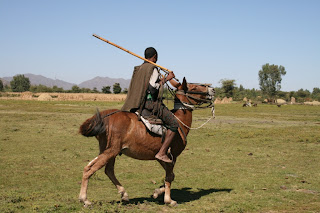Fear of War Increasing in Horn of Africa
By ANITA POWELL – 2 hours ago
ADDIS ABABA, Ethiopia (AP) — Isayas Gabriel remembers when tens of thousands of his fellow soldiers were cut down during Ethiopia's last war with Eritrea, a 2 1/2 year bloodbath over a seemingly insignificant border town called Badme.
Seven years after the war's official end, he is among the many watching as the countries appear to be gearing up for Round 2 — a conflict that would have implications far beyond the Horn of Africa, which the West has long feared could become a safe haven for Islamic extremists.
An international commission charged with marking out the border disbanded recently after the two sides prevented it from physically delineating the border it had chosen, evidence of the stubborn resistance to mediation.
The Brussels-based International Crisis Group said last month that the threat of war is "very real" and "just weeks away." An estimated 225,000 troops have massed on either side of a tense buffer zone.
Medhane Tadesse, a political analyst in the Ethiopian capital, Addis Ababa, said the tensions could affect other conflicts in the region.
"You cannot separate the Ethiopia-Eritrea conflict from what is happening in Somalia, Sudan and even the Middle East," said Tadesse. "This is not just a small, low-key conflict. It's a large-scale military confrontation."
It's one that has been brewing for several decades. Once part of largely Christian Ethiopia, Eritrea, which is predominantly Muslim, fought a 30-year guerrilla war that led to a referendum and independence in 1993. But the countries disagreed over currency and trade issues, and both laid claim to towns along the border, including Badme.
The simmering conflict has fostered instability and left the West worried that the Horn could become a breeding ground for al-Qaida.
Osama bin Laden's terror group already has claimed responsibility for several attacks in East Africa, including the 1998 bombings of the U.S. embassies in Kenya and Tanzania that killed 225 people. A war would further destabilize the larger region and could create more opportunities for extremists to gather and plan attacks.
The United States looks to Ethiopia to help fight the war on terror in East Africa. Meanwhile, the administration of President Bush is preparing a case to designate Eritrea a "state sponsor of terrorism" for its alleged support of Islamic extremists in Somalia.
In fact, experts say Ethiopia, Africa's second most populous country with some 77 million people, and Eritrea, a Red Sea nation of 5 million, are using largely lawless Somalia as a proxy battleground.
Ethiopia sent military support to Somalia last year to drive a radical Islamic group from power, and is now fighting alongside Somali government troops beset by remnants of the Islamic force waging an Iraq-style insurgency.
The leaders of the Somali Islamic group are based in the Eritrean capital, Asmara. U.N. arms experts accuse Eritrea of secretly supplying huge quantities of arms — including surface-to-air missiles and suicide belts — to the Somali insurgents.
Bulcha Demeksa, an opposition parliamentarian in Ethiopia, said his country cannot fight in Somalia and Eritrea simultaneously.
"It is not just soldiers, it is everything," he said. "Logistics, citizens' support, young men's commitment. We cannot do that."
Secretary of State Condoleezza Rice, who traveled to Addis Ababa this month for crisis talks with some of Africa's most unstable states, urged the Ethiopian prime minister, Meles Zenawi, to maintain calm.
"There must not be a resumption of hostilities initiated by either side," Rice said.
Still, there has been an "alarming" military buildup along the border over the past few months, with an estimated 100,000 Ethiopian troops facing off with some 125,000 Eritrean troops, according to the International Crisis Group.
Eritrean soldiers entered the disputed border town of Badme in 1998, sparking a war. Eritrea's agricultural economy — with some 70 percent of the population involved in farming and herding — was devastated, and both armies suffered massive casualties.
"Both believe that sovereignty over Badme is symbolically vital, even if of little intrinsic economic value," the International Crisis Group said. "Whoever finally owns that village will be able to claim victory and justify the war's enormous sacrifices."
After the war ended, the international Eritrea-Ethiopia Boundary Commission gave the town to Eritrea, but Ethiopia has not conceded.
Late last month, the panel ended its work after both countries failed to allow it to physically mark out the border, and formally grant Badme to Eritrea. The panel said it considers its work done, and that Badme belongs to Eritrea.
Isayas, who fought in the 1998-200 war, is sober, but also boastful.
"Since I have witnessed war firsthand, I know exactly its extent of destruction," he said. "If war breaks out, it will be the end of the regime in Eritrea."
The Eritreans, inevitably, see it differently.
"If Ethiopia starts a war, they will be crushed and that will be the end of their history," Eritrean Information Minister Ali Abdu said.
Quelle
















